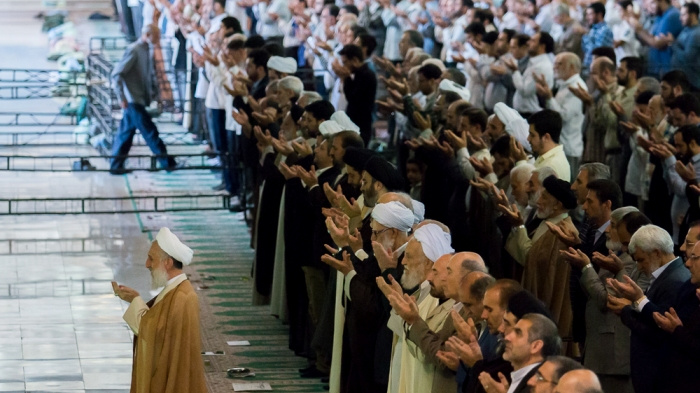Friday Prayers Across Iran: JCPOA, Middle East and concerts

(Picture: Kazem Seddiqi performing Friday prayers in Tehran. Source: Arash Mirsepasi/YJC)
Three days before the start of the Government Week, commemoration of Mohammad-Ali Rajaei and Mohammad-Reza Bahonar, president and prime minister of the country who lost their lives in an explosion masterminded by Mojahedin-e Khalgh Organization (MKO), Friday prayers' sermonizers across the country reviewed Hassan Rouhani's administration's three-year conduct in different areas. With a few exceptions, these reviews were filled with backhanded compliments.
"Let's not blow the JCPOA out of proportion" said Kazem Seddiqi, Friday prayers' leader in Tehran. Seddiqi complained that while the Supreme Leader Ayatollah Khamenei was ceaselessly criticizing Washington for reneging on its promises, the government refused to follow suit. He also implicitly questioned the government's chances to be reelected. "You have no time for politicking and campaign, […] it is not certain that you find the again to serve the people opportunity" he said. In Mashhad, northeastern Iran, Ahmad Alamolhoda thanked the nuclear negotiators for their efforts despite the presence of a "betrayer", "an element of Britain", in the team -a thinly-veiled reference to Abdolrassoul Dorri Esfahani, a member of the nuclear squad's banking expert, who last week was accused of passing economic intelligence to the US and Britain.
In Tehran, Kazem Seddiqi also addressed the state of affairs in the Middle East. "Syria was on the brink of dissolution, Bashar Assad was ready to leave, and global Zionism was preparing for stronger attacks" he said, before the "Resistance", the Iran-Syria-Hezbollah axis, pushed back terrorists "from eighty countries who received dollars from Saudi Arabia." Seddiqi also hoped for Yemen's regaining of its independence and for an end to the "anti-humanity alliance" of Saudi Arabia and its supporters. In Qom, home to Iran's main seminaries, Friday prayers' leader Mohammad Saeidi also hailed victories of the Resistance's and disarray in the terrorists' camp. Addressing Turkey's policy shift vis-à-vis the situation in Syria, Saeidi warned that Ankara had shown "abnormal behavior" before and called for Iran's vigilance. Qom's Friday prayers' sermonizer also touched on the situation in Yemen. Expressing satisfaction with "positive developments" in the country, Saeidi said that Saudis were left with nothing but "disgrace" in their military campaign in Yemen.
In Mashhad, Ahmad Alamolhoda reviewed the government's record through his favorite angle, "cultural libertinism". Referring to the long-drawn-out struggle between Hassan Rouhani's government and conservative clerics over concerts, which has led to cancellation of many concerts across the country by the police, Mashhad's Friday prayers' leader criticized the government for its "disinterested implementation of Islamic values for the sake of a secular class". "Concerts and their cancellation are not people's concern" said Assadollah Imani in the southern city of Shiraz. "We should talk about closure of factories and people's unemployment" he added, employing a common strategy of Principlists that questions the priority of cultural and political openness to solving economic woes.

